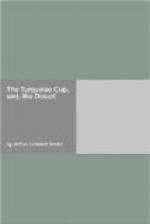They rode in silence for some minutes. Then Abdullah said: “Beloved, I do not know your name.”
She dropped her veil, and his heart fell to fluttering.
“The one who loves me calls me ‘beloved,’” she said, “and I like that name.”
“But your real name?” said Abdullah.
“I was baptized ‘Fathma,’” she said, smiling.
“Doubtless,” said Abdullah; “since all women are named for the mother of the Prophet; but what is your other name, your house name?”
“Nicha,” she answered; “do you like it?”
“Yes,” he said, “I like it.”
“I like ‘beloved’ better,” said the girl.
“You shall hear it to your heart’s content,” said Abdullah.
They went on again, in silence, which was broken by the girl.
“Master,” she said, “if you do not care to speak to me further, I will put up my veil.”
“Do not,” exclaimed Abdullah, “unless,” he added, “you fear for your complexion.”
“I do not fear for my complexion,” said the girl, “but for my reputation; and she smiled again.
“That,” said Abdullah, “is henceforth in my keeping. Pay no heed to it.”
“I am not yet your wife,” said the girl.
“True,” said Abdullah, “and we are making this forced march to learn how I may make you such. Who is your father, beloved?”
“Ilderhim,” she answered; “but why do you ask? You saw him when we started from El Merb.”
“Do you love him?” asked Abdullah.
“I scarcely know,” answered the girl, after a pause. “I have not seen him often. He is constantly from home. He buys me pretty clothes and permits me to go to the cemetery each Friday with my maid. I suppose I love him—not as I love you, or as I love the camel that brought me to you, or the sandal on your foot, or the sand it presses—still, I think I must love him—but I never thought about it before.”
“And your mother?” asked Abdullah.
“I have no mother,” said the girl. “She died before I can remember.”
“And why do you go to Biskra?” asked Abdullah.
“My father sends me,” said the girl, “to a great lady who lives there. Her name is Mirza. Do you not know her, since you lived in Biskra?”
Abdullah did not answer. Something suddenly went wrong with his saddle, and he busied himself with it.
“I am to be taught the languages and the ways of Europe,” continued the girl, “music and dancing, and many things the desert cannot teach. I am to remain two years, and then my father fetches me. Now that I consider the trouble and expense he is put to on my account, surely I should love him, should I not?”
Abdullah’s saddle again required attention.




